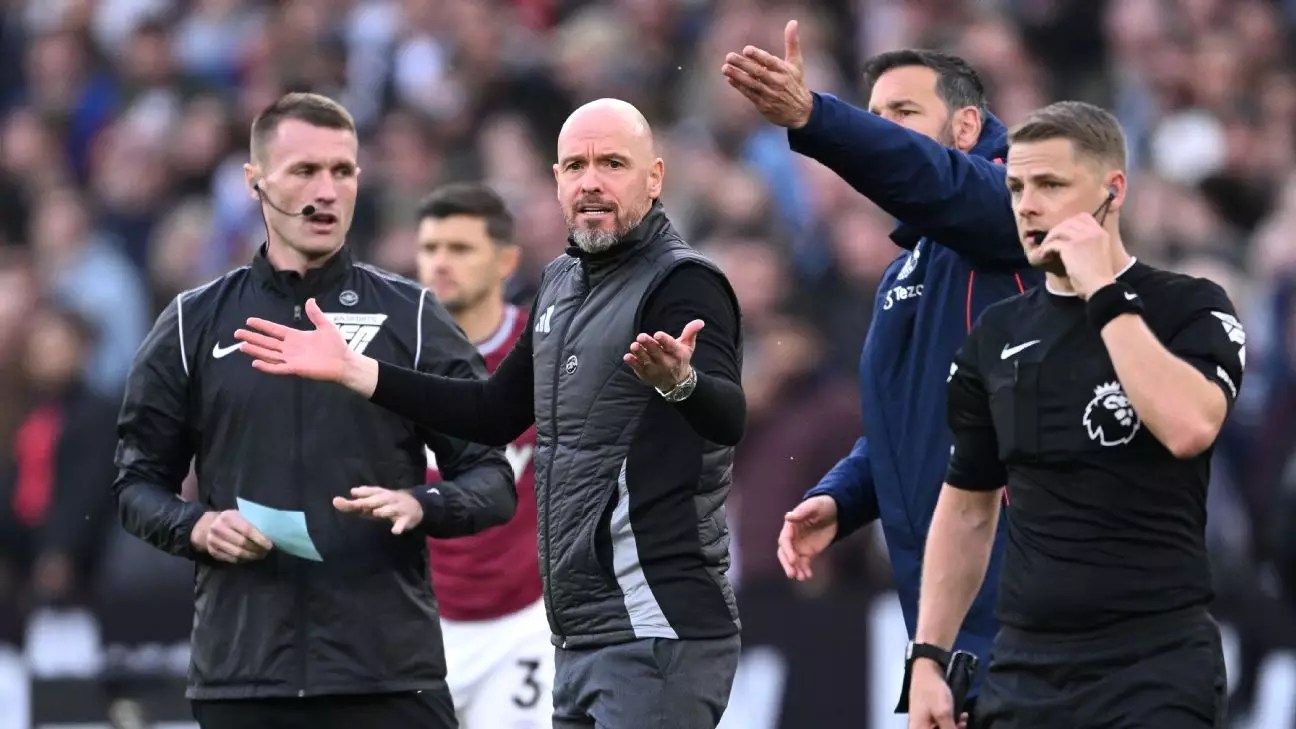The introduction of Video Assistant Referee (VAR) technology into football has undoubtedly transformed the way matches are officiated, aiming to increase the accuracy of crucial decisions. However, as recent events in the Premier League demonstrate, its implementation is not without controversy. A critical case emerged from a match between West Ham United and Manchester United, which culminated in the firing of Erik ten Hag as Manchester United’s manager. This incident serves as a prominent example of the ongoing dialogue about refereeing standards, technology reliance, and managerial accountability.
On October 27, during a tense Premier League match, the stakes were high for Manchester United, who were struggling with an unprecedentedly poor start to their season. The game, which was level at 1-1, took a dramatic turn in the dying minutes when VAR intervened after a collision in the penalty area involving Matthijs de Ligt and West Ham’s Danny Ings. Initially, referee David Coote chose to allow play to continue, demonstrating his judgement in what seemed to be a non-foul. However, after VAR assistant Michael Oliver reviewed the incident, he recommended that Coote take a closer look at the situation.
Upon reviewing the incident on the pitchside monitor, Coote awarded a penalty, which Jarrod Bowen successfully converted, handing West Ham a crucial 2-1 victory. The fallout from this decision was immediate and severe for United. Ten Hag, already under significant pressure, was relieved of his managerial duties the following day.
In a candid discussion on the “Match Officials Mic’d Up” show, Howard Webb, the head of refereeing for the Premier League, acknowledged the misjudgment in the penalty call. Webb critiqued the VAR’s focus on de Ligt’s leg rather than assessing the overall context of the play. He stated that the VAR’s intervention did not meet the standards expected for such a significant ruling, suggesting that the original decision should have stood as a non-penalty. Webb said, “On balance, I don’t think it’s a penalty kick. I would prefer no foul being given, no penalty.” His assertion highlights a critical tension within VAR implementation; the technology, designed to assist, can inadvertently escalate pressures on match officials and teams.
Webb’s admission is notable, particularly given the high stakes involved in such a crucial match. Mismanagement in key moments, especially with life-altering consequences like a managerial dismissal, raises questions about the accountability of not only the referees but the technology itself. If the goal is to enhance the accuracy of officiating, what does it signify when such a decision leads to drastic consequences?
Despite this particular incident drawing attention, it is not isolated. Webb also commented on another contentious decision involving Arsenal’s William Saliba, who received a VAR-reviewed red card for denying an obvious goal-scoring opportunity. The judgment appeared to align more closely with the established criteria for VAR intervention, as Webb confirmed the on-field referee’s decision was incorrect.
These two contrasting scenarios exemplify where VAR has functioned effectively and where it has faltered. So far this season, only three VAR errors have been reported, which is a marked improvement from the 13 mistakes identified at the same point the previous year. However, there are ongoing discussions regarding how VAR’s thresholds for intervention are defined and applied, which continue to elicit strong reactions from clubs, managers, and fans alike.
The case of West Ham versus Manchester United encapsulates a larger narrative of technology’s role in football. VAR was introduced to minimize human error, yet its presence can amplify tensions during matches, particularly when the stakes are as high as a manager’s job or a team’s shot at success. The dichotomy of technology—a supposed enhancer of the officiating experience—can often, as observed, contribute to confusion and erroneous decisions that impact the trajectory of a season.
Reflecting on the resultant managerial changes, it becomes clear that the implications of VAR do not solely affect match outcomes; they have profound repercussions for careers and club trajectories. As the Premier League continues to navigate the complexities of VAR, both officials and clubs alike must recalibrate their understanding of what constitutes a fair and accurate officiating process, ensuring that technology remains a supportive tool rather than a source of further controversy.
While VAR was intended as a solution to age-old refereeing dilemmas, its integration into Premier League football is fraught with challenges that require ongoing analysis and adaptation. The West Ham versus Manchester United incident stands as a stark reminder of the fine line between technology as a tool for clarity and its potential to muddy the waters of sporting integrity.


Leave a Reply